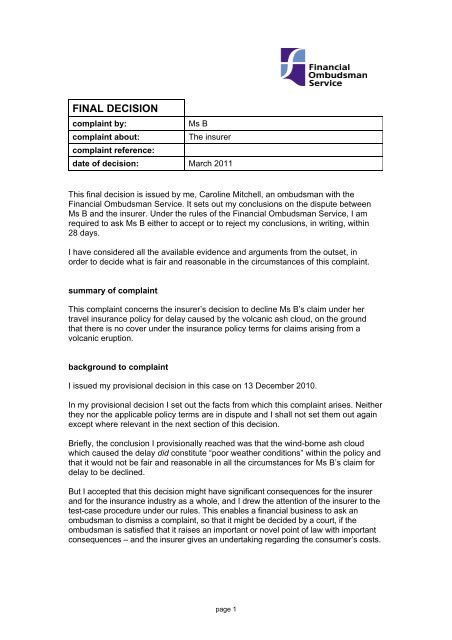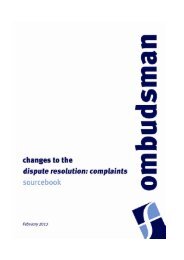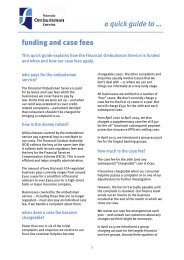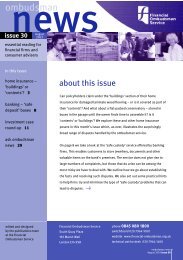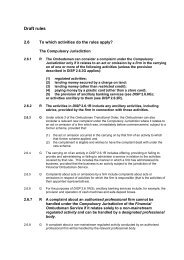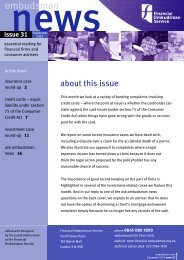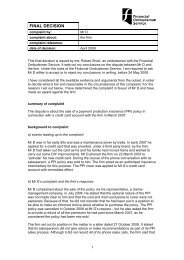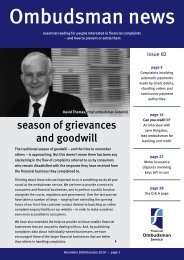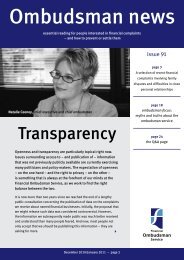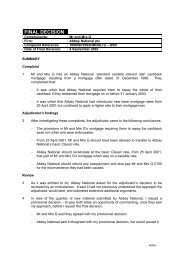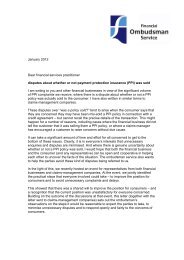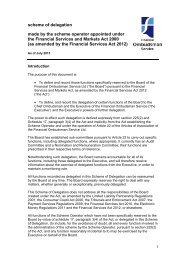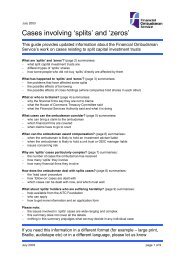FINAL DECISION - Financial Ombudsman Service
FINAL DECISION - Financial Ombudsman Service
FINAL DECISION - Financial Ombudsman Service
You also want an ePaper? Increase the reach of your titles
YUMPU automatically turns print PDFs into web optimized ePapers that Google loves.
<strong>FINAL</strong> <strong>DECISION</strong>complaint by:Ms Bcomplaint about:The insurercomplaint reference:date of decision: March 2011This final decision is issued by me, Caroline Mitchell, an ombudsman with the<strong>Financial</strong> <strong>Ombudsman</strong> <strong>Service</strong>. It sets out my conclusions on the dispute betweenMs B and the insurer. Under the rules of the <strong>Financial</strong> <strong>Ombudsman</strong> <strong>Service</strong>, I amrequired to ask Ms B either to accept or to reject my conclusions, in writing, within28 days.I have considered all the available evidence and arguments from the outset, inorder to decide what is fair and reasonable in the circumstances of this complaint.summary of complaintThis complaint concerns the insurer’s decision to decline Ms B’s claim under hertravel insurance policy for delay caused by the volcanic ash cloud, on the groundthat there is no cover under the insurance policy terms for claims arising from avolcanic eruption.background to complaintI issued my provisional decision in this case on 13 December 2010.In my provisional decision I set out the facts from which this complaint arises. Neitherthey nor the applicable policy terms are in dispute and I shall not set them out againexcept where relevant in the next section of this decision.Briefly, the conclusion I provisionally reached was that the wind-borne ash cloudwhich caused the delay did constitute “poor weather conditions” within the policy andthat it would not be fair and reasonable in all the circumstances for Ms B’s claim fordelay to be declined.But I accepted that this decision might have significant consequences for the insurerand for the insurance industry as a whole, and I drew the attention of the insurer to thetest-case procedure under our rules. This enables a financial business to ask anombudsman to dismiss a complaint, so that it might be decided by a court, if theombudsman is satisfied that it raises an important or novel point of law with importantconsequences – and the insurer gives an undertaking regarding the consumer’s costs.page 1
my findingsThe insurer responded to my provisional decision by making representationsregarding the test-case procedure and further submissions on the core issue of poorweather conditions. Ms B has given me her comments on the insurer’s applicationunder the test-case procedure provisions.dismissalI will deal first with the insurer’s application that I should exercise my discretion todismiss this complaint, so that it can be decided by a court.The test-case procedure is contained in our rules at “DISP 3.3.5”. It has beenavailable to financial businesses (”the respondent” in the language of the rules)since 1 October 2005 but has yet to be used in practice. So I have given very carefulconsideration to its appropriateness in this case and to its practical application.I have a discretion whether or not to exercise the power (“The ombudsman maydismiss …”). I can only exercise that discretion in favour of dismissing if I amsatisfied that the complaint (DISP 3.3.5(2)):(a) raises an important or novel point of law, which has importantconsequences; and(b) would more suitably be dealt with by a court as a test case.So I must consider whether there is an important or novel point of law which hasimportant consequences – and whether the complaint would more suitably be dealtwith in court as a test case? If the answer to both the preceding questions is “yes”,should I exercise my discretion to dismiss the complaint? I will look at each of therequired elements here in turn.Is this an important or novel point of law which has important consequences?In my provisional decision I said that I was not aware of any legal ruling on whetheratmospheric conditions like those involved in this case constitute “poor weatherconditions” for the purposes of an insurance claim. The insurer had not and still hasnot drawn my attention to any such ruling.Since I issued my provisional decision, there has been a decision in the County Court(which I refer to later). But decisions in the County Court, unlike those in the HighCourt, do not create legal precedent.This remains in essence a matter of interpretation of the contract. The approach ofthe court is to look at the ordinary and natural meaning of the words. That is theapproach adopted by the ombudsman. Where there is ambiguity in a standard-formcontract, the court will interpret the term in the way that is less favourable to the partywho supplied the wording. That is also the approach adopted by the ombudsman.The ombudsman has for thirty years (since the creation of the Insurance<strong>Ombudsman</strong> Bureau in 1981) been interpreting consumer insurance contract-termsin accordance with the principles of the court. I am not persuaded that a novel orimportant point of law arises every time that it does so. Should a party consider thatthere are sufficient grounds, the remedy of judicial review is available.page 2
I accepted in my provisional decision, and continue to accept, that my decision mayhave important consequences for this insurer. It may also have important consequencesfor the insurance industry as a whole and for its customers, though only in these unusualcircumstances.I am aware that some insurers made payments on an ex gratia basis. Other claimshave quite reasonably been rejected (as have other complaints made to theombudsman service) either because they are clearly not within the relevant policyterms or because a relevant exclusion applies.I understand that the arrangements made between businesses in the insurancemarket (reinsurance contracts) may also to some degree turn on the interpretation of“poor weather conditions” in these circumstances. Such contracts between insurancebusinesses are outside the scope of the ombudsman service. Nothing I decide herehas any direct bearing on the proper interpretation of reinsurance contracts, nor is itmy intention that it should do so.I also agree, as the insurer argues, that there may well be public interest in theoutcome of this dispute. That, of course, is true for many disputes the ombudsmanis required to handle. But it does not seem to me that this particular case requires adecision by a court, rather than by an ombudsman, just because there may be apublic interest in its outcome. Ombudsmen are very experienced in consideringconsumer matters of interest to the public.The insurer says that “a further important issue arises as to what can be construedas ‘good industry practice’ which requires clarification for this and other future cases.”It is not, however, argued that this is itself an important or novel point of law. Therules allow an ombudsman who is considering what is fair and reasonable in all thecircumstances of a case to take into account, where appropriate, what s/he considersto have been good industry practice at the relevant time.I am not wholly satisfied that this matter does raise a novel or important point of law.But even if I were, I should in addition need to be satisfied that the complaint wouldmore suitably be dealt with as a test case by a court.The test case procedureThe insurer made the following representations:It is respectfully submitted that this complaint should be dismissed so that thecourt may consider it as a test case for the following reasons:(a) The central issue in the complaint is whether on the basis of ordinary rulesof contractual construction delay caused by the volcanic ash plume wascaused by “poor weather conditions” under Section F of the policy. This is animportant point of law which the court should decide after hearing full legalsubmissions from both the insurer and the complainant. This point of law iscentral to the outcome of the dispute;(b) The complaint has extremely significant consequences for the businessgiven the number of policyholders with similar potential claims is believed tobe approximately [several thousand] (xx of whom have at the time of writingcontacted the ombudsman service) with the associated financial exposure aswell as the impact on the company’s reputation;page 3
(c) Given that an ombudsman’s final decision would in practical terms bindthe business in all other similar cases, it is conservatively estimated that thecompany would have to pay in the region of £xx million of claims. This is anextremely significant sum given it would be in excess of around xx% ofnormal annual average claims expenditure;(d) The complaint is also of very considerable importance to the travelinsurance sector generally not least in the light of thousands of other claims(it appearing common ground that the ash plume disrupted 10 millionpassenger journeys). As such it is estimated that travel insurance sector as awhole would be faced with paying tens of million of pounds of claims;(e) In addition the issue of insurance claims following the volcanic ash plumereceived almost unprecedented media coverage with the issue of the extentof travel insurance coverage highlighted as a major issue in many forums.There is therefore a considerable public interest in this issue which should beventilated in a public forum such as a court;(f) It would appear that the issue of “consumer expectation” was treated bythe ombudsman service as a central one in the complaint. This raisesimportant issues in respect of the primacy of contractual terms. Related tothis, the decision would appear to suggest that an insurer has to specificallylist and exclude all events that are not covered by the policy. This wouldclearly have major implications for the drafting and presentation of travelinsurance policies;(g) In addition it would seem that the ombudsman service placedconsiderable weight on the allegation that other consumers’ claims have beenmet by their insurers. Leaving aside the fact that there has been no evidenceprovided as to the number of such claims no consideration appears to havebeen given to the basis of any such payments (understood by the business tobe purely on a commercial ex gratia basis). In any event a further importantissue arises as to what can be construed as “good industry practice” whichrequires clarification for this and other future cases;(h) It is clear that a court considering the issues involved could deal with themeffectively deal (sic) by way of an application for a declaration of non-liability.The issues are relatively narrow and easily dealt with by the court.In my provisional decision I said that I was conscious that Ms B had been waitingpatiently for this matter to be resolved – and that she would be disappointed byfurther delay and possibly inconvenienced by any court action.After receiving the insurer’s submission about the test-case procedure, I remainedconcerned about the likely impact of this on the consumer, Ms B. She had the optionof going to court available to her at the outset. Instead, she came to the ombudsmanservice which is an informal alternative to the court and is free to the consumer. Iimagined she would have little appetite to involve herself in court proceedings andexpose herself to costs.That is borne out by what she said, after considering the insurer’s application for thetest case procedure which I sent to her. She said:page 4
I have two points I would like the ombudsman to consider before it makes itsrecommendation to the insurer.1. The ombudsman has already indicated an initial recommendation inour favour.2. The insurer has already been defeated in a case in county court which isessentially identical to ours ie Is the ash cloud weather? They made apayment in this case with no appeal.It would seem to me this is just another reason to delay paying out what Iunderstand totals a large sum of money to everyone in our situation. Whilst Ican understand their situation, they are neglecting their duty. We paid ourpremium to this company who now need to fulfil their side of our insuranceagreement.The County Court case to which Ms B refers was reported in the press and was infact against a different company, albeit one whose policy was underwritten by thisinsurer. The judge there did conclude, I understand, that the ash cloud constitutedpoor weather conditions under the terms of a policy similar to this. Ms B clearly doesnot indicate any enthusiasm for following this matter to court.The insurer explained in its representations that it felt the issues could be dealt withby way of an application to the court for a “declaration of non-liability”. The DISPrules are silent on the procedure to be used. And it was not clear to me what thiswould actually mean for the consumer. So I asked the insurer how it envisaged thatthis procedure would work in practice.The insurer explained that the proposed procedure was selected in order “to obtainan authoritative decision as soon as is practical in a cost effective manner”. Theprocedure was “chosen due to its general, non-adversarial nature”. The insurerenvisaged that the application would be brought in the Commercial Court divisionof the High Court “whose judges have extensive experience in insurance policyinterpretation”.I am grateful to the insurer for this explanation. It seems to me that the insurer isseeking a ruling to settle issues wider than those that directly impact on policyholders.I am conscious that there is a wide range of parties who could have an interest in adeclaration by the Commercial Court about the application and interpretation of “poorweather conditions” to this and other contracts. No doubt there might be a disputeabout how their interests could be protected in this process.In any event, the insurer is, in effect, expecting Ms B to bear the burden (other thanthe cost burden) of being the counterparty to significantly complex proceedings –championing issues that have ramifications well beyond her own case. It does notappear to me that this is a burden that Ms B should bear.Should I exercise my discretion to dismiss the complaint?Having carefully considered the representations of the parties and the circumstances,I do not consider that I should exercise the discretion to dismiss this case.Instead, I propose to go on to decide the merits of the case. In deciding the case,I am not purporting to make a general legal ruling. I am deciding what is, in myopinion, fair and reasonable in the circumstances of this case.page 5
the complaintDoubtless, Ms B agrees with the view I expressed on the merits of this case in myprovisional decision. The insurer believes it is wrong and has made furthersubmissions.For the sake of clarity, I reproduce here what I said in my provisional decision aboutmy reasons for deciding that the ash cloud did constitute poor weather conditionswithin the terms of the policy:I am not aware of any legal ruling on whether atmospheric conditions likethose involved in this case constitute “poor weather conditions” for thepurposes of an insurance claim, and the insurer has not drawn my attentionto any such ruling.But I am required to take account of the law. So in the absence of a legalruling on this point, I must have regard to the general approach of the courtsto interpreting a contract. In essence I must look at the ordinary and naturalmeaning of the words within the policy.In reaching his initial assessment that the conditions here could be termedpoor weather, the adjudicator took as his starting point the ChambersDictionary definition of weather which is “the atmospheric conditions in anyarea at any time, with regard to sun, cloud, temperature, wind and rain etc”.The insurer has sent me representations based, I gather, on legal advice thatit has received. These address particular aspects in an attempt to persuademe that the adjudicator was wrong in concluding that wind-borne volcanic ashconstituted an atmospheric condition and could therefore be considered to be“poor weather conditions”.The insurer also says that, in the absence of a legal definition, “weather” iscommonly understood to relate to atmospheric conditions relating specificallyto heat, wind and water precipitation in its various forms. Various otherdictionary definitions are put forward by the insurer to define weather insimilar terms and it is argued that “etc” in the context of the ChambersDictionary definition quoted above must relate to other forms of precipitationan “cannot” refer to a different matter such as a wind-borne plume of volcanicash. Similarly, it is argued, a cloud in the context of weather can only mean a“cloud” of water precipitation.It is further argued that the mere fact that a substance is in the atmospheredoes not mean that it is to be regarded as a question of weather – one of theexamples quoted is that of a flock of birds. And it is stated that theMeteorological Office does not regard the wind-borne ash cloud from theIcelandic volcano as being an issue relating to weather.I must determine the ordinary and natural meaning of “poor weatherconditions” and I am conscious that I am dealing here with a retail travelpolicy. The atmospheric conditions that led to cancellation of Ms B’s flightarose, in layman’s terms, from a combination of volcanic material and wind.Ms B, and many other complainants to the ombudsman service, told us thatpage 6
they believed that these unusual conditions were an example of poorweather. That does not strike me as an unreasonable belief.The insurer says that risk to travel caused by volcanic eruptions is not a newphenomenon. This is in reference to the eruption of Mt St Helens in 1980 andthe damage caused to an aircraft flying through a cloud of volcanic dust. Theinsurer states that the omission to cover this as an insured peril since 1980 isdeliberate. Volcanic eruption is not, I have already accepted, an insured peril.But it was always open to the insurer to put the matter beyond doubt, giventhat they knew such situations could arise, albeit rarely, by excludingaltogether claims arising from volcanic ash.If weather as an atmospheric condition can, as appears to be accepted,include “cloud”, must that cloud itself only be one of water precipitation? Quiteclearly the ash formed clouds. And these were clouds which were as a matterof fact recorded and tracked by the Meteorological Office. It is my view that“poor weather”, within its ordinary and natural meaning, would include an ashcloud borne on the wind. A flock of birds, as referred to above, which arecapable of independent movement, would not, however, constitute poorweather.It is a general principle of English courts that an ambiguous contractual termmust be given the interpretation that is less favourable to the party whosupplied the wording, which was the insurer in this case. So although Iconsider that “poor weather” encompasses ash on the wind, if there is anyambiguity about it, this principle will apply.The insurer contends that “Outside the context of an insurance claim, noordinary person would ever refer to the eruption of the Icelandic volcano andthe dust plume as having given rise to a weather event”. It is suggested thatwere they to do so, many more policyholders would have pursued claims. Iam not sure that follows (many claims were in fact met by other insurers -albeit described as goodwill settlements to avoid setting a precedent). But inany event, we have seen a number of complaints from “ordinary” members ofthe public where that is exactly what they said, as indeed did Ms B.Despite the many thousands of people affected by these atmosphericconditions, and the consequent claims made by many of them under travelinsurance policies with numerous insurers, the <strong>Financial</strong> <strong>Ombudsman</strong> <strong>Service</strong>has received relatively few cases on this issue relating to a limited number ofinsurers – most of the complaints are against just three insurers.I am not in a position to know the percentage of claims that were settled byother insurers – but even if this were not the majority of claims, I am of theview that it would still represent good industry practice by insurers assistingtheir customers who suffered loss from an almost unprecedented event andthrough no fault of their own. I must, of course, under the DISP rules, haveregard to what was, in my opinion, good industry practice at the relevant time,if that is appropriate. In these unusual circumstances, I am of the view that itis appropriate to have such regard.The insurer has referred me to the submissions it made originally in respect of themeaning of weather – and I addressed these in my provisional decision.It has made further submissions which I reproduce here:page 7
In addition, being deliberately concise and focusing on the understanding of alayperson, we would make the following additional points:(1) At the time of the Volcanic Ash event the material weather consisted of:- No discernible ground level wind, bright sunshine and clear blue skies,- Circulation of air in the upper atmosphere which did not causediscernible movement of air at ground level,- A dissipating and invisible plume of particles in the upper atmosphere.Using the ordinary and natural meaning of words none of the aboveconditions constituted “poor weather”. Again while there was a visibleplume of ash issuing from a volcano in Iceland this had no effect onthe weather.(2) The weather at the time would have been described by any layperson as“pleasant”, “nice”, or indeed “lovely” but certainly not “poor”. Again usingthe ordinary and natural meaning of words it is neither fair nor reasonableto make a finding against the insurer on the basis we provide cover for“poor weather” when the weather was plainly no such thing.(3) Similarly when one is considering apparatus or devices to measure the“weather” such as a weather station or weather balloon used by theMeteorological Office and other international weather agencies it iscommon understanding that the factors to be assessed are temperature,barometric pressure and humidity (their emphasis) – not ash particles.Once more we believe in lay person’s terms this clearly highlights that the ashwas not a cloud and more particularly not ‘poor weather’.I cannot tell whether the weather was “pleasant” across the whole of the affected partof Europe and the North Atlantic during the period of the flight disruption. Andweather that was judged “nice” in one context might nevertheless be adverse inanother (for example, dry and sunny conditions resulting in drought). I note thatthe insurer continues to refer to “poor weather” whereas the policy refers to “poorweather conditions”.Many of those consumers who were affected by this event believe that this was acloud of ash. I do not consider that it is stretching the ordinary meaning of the wordsto interpret the cloud of ash moved by the wind as an example of a poor weathercondition. The insurer will be aware of what their customers who have complained tothem about this policy wording and this event have said. I doubt that consumersconsidering the cover afforded by their retail travel policy would concern themselveswith barometric pressure, humidity and temperature.I am satisfied that Ms B was adversely affected by a wind-borne ash cloud and that itwould be fair and reasonable in the circumstances to treat this as “poor weatherconditions” for the purposes of her consumer policy.The insurer has raised two other issues which I shall address.First, the insurer says:“It would appear that the issue of ‘consumer expectation’ was treated by the<strong>Financial</strong> <strong>Ombudsman</strong> <strong>Service</strong> as a central one in the complaint. This raisespage 8
important issues in respect of the primacy of contractual terms. Related tothis, the decision would appear to suggest that an insurer has to specificallylist and exclude all events that are not covered by the policy. This wouldclearly have major implications for the drafting and presentation of travelinsurance policies.”I would not necessarily disagree with the last sentence here – but this was not acentral issue in my provisional decision. I thought, and think, that consumers who aredelayed by atmospheric conditions which they believe to be poor weather conditionswould not unreasonably expect this to be covered by the consumer travel-policy theyhave taken out for unexpected eventualities outside their control.And I would not expect all potential events to be specifically listed as exclusions –that would clearly be unreasonable. But here the insurer has told me that the risk totravel caused by volcanic eruption has been known since Mt St Helens erupted in1980. This dispute would not have occurred had they excluded a known risk, whichthey could easily have done.Finally, the insurer says that I seem to have placed great weight on the allegationthat other consumers’ claims have been met by their insurers. They say that noevidence has been provided as to the number of such claims – nor doesconsideration appear to have been given to the basis of any such payments.In fact, I acknowledged that I was not in a position to know the percentage of claimsthat were settled by other insurers. I still am not. But I do know that some insurerssettled claims. This was widely reported in the press at the time. That they weresettled on an ex gratia basis (doubtless so as not to set precedent) makes nodifference to my mind when considering whether this was good industry practice.I can add that a number of claims have also been settled following the referral ofcomplaints to the ombudsman service without the need for a formal, binding finaldecision.And, as a last point, the insurer did initially argue that an exclusion applied to Ms B’sclaim in any event. About this I said:I note the wide effect that the insurer seeks to read into the general exclusionon page 9 of the policy – that the claim arose because of “the … airline … notbeing able or not being willing to carry out any part of their obligation.” I havealready commented on the approach to interpretation that would be taken bythe courts – that words should be given their ordinary and natural meaning.I find it difficult to accept that the parties intended this exclusion to beinterpreted so widely as to go beyond default by an airline and override thespecific cover provided by the policy. Using the insurer’s argument wouldexclude, for example, any failure of public transport due to uncontested poorweather conditions (such as a hurricane) because the transport providerwould not be “able” to provide transport.No further representations have been made in respect of this and I remain of theview that the claim is not caught by the exclusion.I thank the parties for their patience while this has been under consideration.page 9
my decisionI do not dismiss this complaint under the test-case procedure contained in theDISP rules.As regards the merits of the complaint, my opinion is that, in all the circumstances:• it would be fair and reasonable for the insurer to treat the wind-borneash cloud as poor weather conditions under Ms B’s travel policy;• it would not be fair and reasonable for the insurer to decline Ms B’s claim;• Ms B’s claim should succeed and the insurer should pay the benefitavailable under her policy plus interest (at 8% per year simple).Caroline Mitchellombudsmanpage 10


